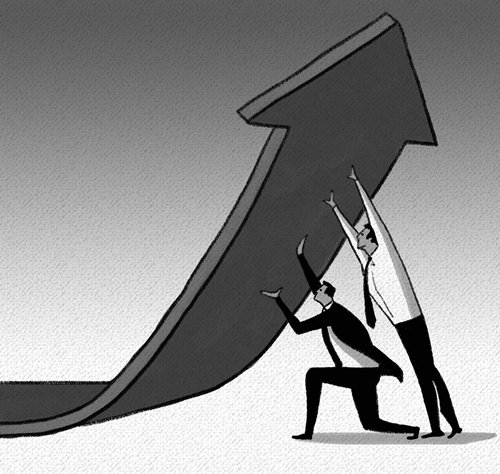HOME >> OPINION
China vital to Myanmar’s peace, progress
Source:Global Times Published: 2019/5/19 17:13:40

Illustration: Liu Rui/GT
Editor's Note:
Amid rapidly changing Asian dynamics and news reports on claimed civilization clashes, China hosted the Conference on Dialogue of Asian Civilizations (CDAC) last week. How should we refute such a claim as the "clash of civilizations?" Global Times (GT) reporter Wang Wenwen talked to Ko Ko Hlaing (Hlaing), co-founder of Myanmar's Center for Strategic and International Studies, who served under Thein Sein as the chief political adviser to the President's Office, on the sidelines of the conference. Hlaing also shed light on the recent trajectory of China-Myanmar relations.
GT: You're in Beijing for the CDAC, an event aimed at promoting harmony among civilizations in Asia and beyond. How would you refute the recently-claimed and hotly-contested "clash of civilizations" theory?
Hlaing: A clash of civilizations occurs when civilizations have little understanding of or misunderstandings with each other, and their interests clash. So, if we would like to reduce those threats, we need to develop a mutual understanding and construct the right approach for common interests on a common platform.
That's why this conference is being held. It can contribute to clearing up misunderstandings or misconceptions. And it can foster closer cooperation for the region's common future.
GT: How is China's influence in Myanmar manifested?
Hlaing: China is Myanmar's most important neighbor. We share borders spanning more than 2,000 kilometers. On the economy, China is still its largest trade partner and one of the country's most important investors. So, China is indispensable to Myanmar's economic development. Politically or strategically, China's role in Myanmar's decision-making is vital.
We must always consider our relationships with the US and China on the global level and regionally with India and China. Myanmar is located between those powers, and its main concern is how to balance its relationship with them. Myanmar provides a balanced approach toward all partners, because we've adopted a peaceful coexistence policy. The five principles of peaceful coexistence were actually founded by Myanmar and China in the 1950s.
GT: Myanmar State Counselor Aung San Suu Kyi has followed a pragmatic route to foreign policy. What is her role in bilateral relations?
Hlaing: There is a difference between rhetoric and reality. When she was in the opposition, her rhetoric was inspired by more democratic concerns, more pro-democracy and was more pro-Western.
But when she took political office, she had to be more pragmatic. China is our most important neighbor and she has to be more realistic. That's why the current government is trying to maintain relations with China.
There is common ground between the two countries. We are still undergoing reform. Myanmar is facing a lot of challenges with comprehensive reform, not only in politics, but also economically and socially. China has more experience in reform because you have had 40 years of it. So, we can learn from your experience despite our different political systems. But governance of the state, administrative system, and practices are quite similar. We can use your experience and learn from your successes and failures.
GT: What do you think of China's role on the Rohingya issue and mediation between Myanmar and Bangladesh?
Hlaing: I appreciate China's role. It is a very positive one. The Chinese authorities and officials concerned have a good understanding of the issues. China has been a good neighbor of both countries and stakeholders like Bangladesh and Myanmar. So, China can use its friendship and solve the problem peacefully. China is a reliable mediator.
The West always wants to exploit regional or local issues so they can intervene in regional politics, especially with the strategic competition between China and the US. Myanmar is a pawn in this game, and the West would like to use Myanmar as a pawn in their strategic games.
GT: How can China-proposed Belt and Road Initiative (BRI) and Myanmar's Sustainable Development Plan be incorporated in Myanmar's development?
Hlaing: We already have a national development plan to integrate with regional economies. Our domestic mission and development plan has to expand trade links with China, and BRI and China-Myanmar Economic Corridor offer opportunities. Their interests overlap and we can find common ground. We cannot say that the BRI compensates for Chinese efforts in the peace process.
China is important in our peace process because many ethnic groups live near the Chinese-Myanmar border and have access to illegal businesses like drug trafficking or arms smuggling, and work with Chinese criminal gangs. There are transnational criminal activities. So, cooperation with China is very important to Myanmar.
At the same time, the economic and social development of those areas, which are conflict areas, is very essential to solving the peace issue. Chinese cooperation to develop the economic corridor and special economic zones near the border area will enhance the peace process. While they are separate issues, they are related.
GT: The Myitsone Dam project is waiting to be restarted. What's the Myanmar government take on this?
Hlaing: I think the Myanmar government is sandwiched between national interests and public opinion. Public opinion is influenced by Western media and instigation in the countries. The concern is that the Myitsone Dam is harmful to the environment, so it will not move forward. But as far as national interests are concerned, we need electricity to develop. The Myitsone Dam can help fulfill the country's electricity requirements.
Since our political systems are based on democracy and our constituencies, every government dares not resist public sentiment.
We need to tackle misconceptions to convince the public that hydroelectric projects are not as harmful to the environment as exaggerated by some media.
Every development process can impact the environment, but we need to control it. We need to mitigate the negative effects. People would be shocked if we build the dam, and fear it would ruin the whole eco-system. But that idea cannot be said 100 percent correct.
Posted in: VIEWPOINT,ASIAN REVIEW